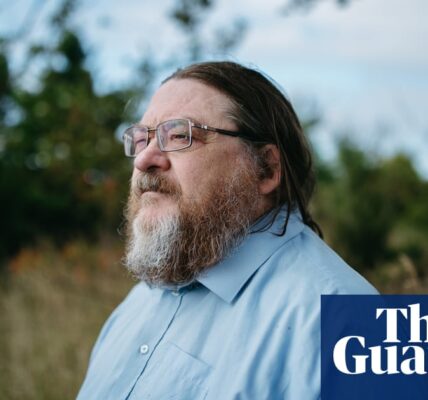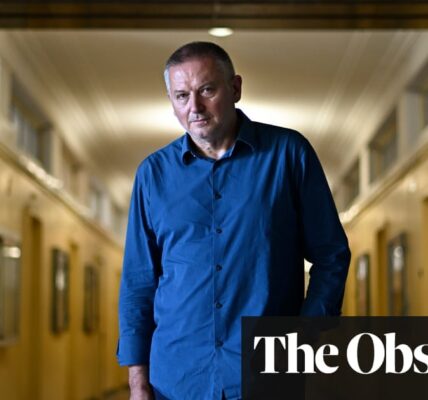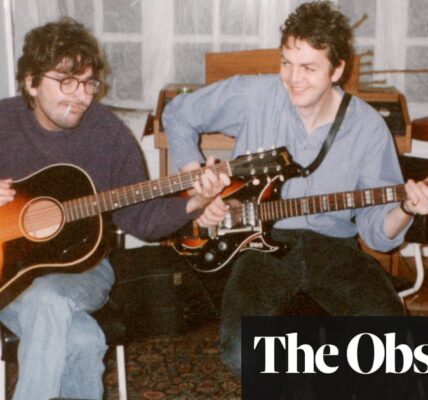‘If you want to call me a witch … that’s fine’: Suranne Jones on magic, misogyny and murder
When Suranne Jones’s husband first suggested they make a documentary about witch trials she felt uncomfortable. “What are people going to think?” she worried. After all, it would involve revealing her longstanding interest in “alternative medicines, shamanism and crystal work”. She grew up near Pendle, Lancashire, where the UK’s most famous witch trials took place, and where they would “all talk about the trials. My Auntie Jean especially.” Nonetheless, she’s rarely spoken publicly about her interest in witches. “Because it’s still taboo.”
Fortunately, that reluctance didn’t last and her two-part documentary, Suranne Jones: Investigating Witch Trials, airs on Channel 4 this week. In it, Jones visits famous sites of witch trials – Salem in Massachusetts, Bamberg in Germany and Pendle itself – to explore the horrifying burning of innocent women at the stake, and the underlying misogyny that still results in witch trial-esque online persecutions of women today. She meets modern witches who embrace the figure of the witch as an outsider and truth teller. She even participates in ritualistic ceremonies.
“The idea was to try to marry up my fascination with the witch trials and the modern witch because they aren’t the same thing,” she says. “Except what I learned is, they are.”
Jones may well be one of the most recognisable faces in British television, and is known for playing tough women who don’t bow down, from her vengeful titular role in Doctor Foster, to hardened detective Amy Silva in Vigil and the queer trailblazer Anne Lister in Gentleman Jack. But when she sees her name in the title of this show “I feel slightly sick”, she says. “Because I’m like: oh God, that’s me rather than me being a character.”
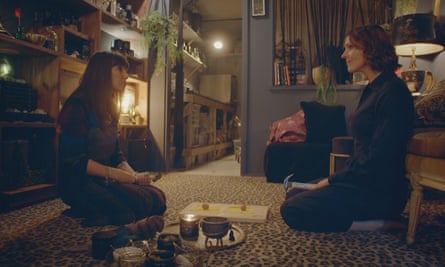
It is clear talking to her that the making of Investigating Witch Trials, and learning about these maligned women of the past, has been a journey of self-realisation.
“I questioned myself: why from young was I interested in witches?” she says. Jones initially fell in love with them through books: as a child it was The Wizard of Oz, then as a teen it was Wicked. “When I first met my husband I was always reading books with witch characters. He’d say: ‘Another witch book?’
“I think it was their wildness, their otherness,” she says. It chimed with her own feeling of otherness. Jones was bullied over her weight at school. And though she was raised Catholic – going to church “twice a week, on Wednesday with school and Sunday with parents” – by 13 she’d decided it wasn’t for her: “I had a lot of gay friends, and I just didn’t really fit. I needed to find other people I could relate to.”
When, in her early 20s, she was working on Coronation Street playing Karen Phillips (later McDonald) she found herself “struggling to adapt from being someone who worked in a pub to this level of fame”. She sought spiritual solace in alternative medicine. “I was totally open: give me the acupuncture needles, tell me what other cultures do.
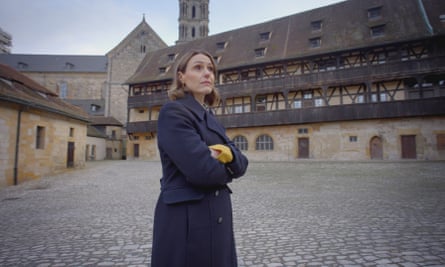
“And then the magic stuff comes in as well, where I’m fascinated by what magic actually is. I perform a certain kind of magic. Actors perform a certain kind of magic.”
I tell Jones I have noticed a revival among women of my own millennial generation in all things mystical. I offer my theory: that medical sciences have historically overlooked women, and that given the many areas in healthcare that women have worse outcomes than men, it’s inevitable that they will be open to experimenting with ideas and practices for help.
She tells me about the unfilmed ceremony she held with Semra Haksever, AKA the Witch of Hackney Wick, who features in the documentary. “It was a magic circle, which was like meditation and then an ancestry spell, calling on anyone who wanted to come and help me give a voice to this documentary. It was a beautiful moment. Now is that ‘magic’, or is that Semra empowering me?”
I can’t help but wonder if Haksever knew it was Jones’s first documentary as herself – one of the first projects from her new production company, which she started precisely because she felt disempowered on show after show.
“[Starting the production company] I wanted to say: ‘Hang on, what about my worth?’” says Jones. “Because I’m working with writers, I’m going through scripts, I’m suggesting casting, I’m bringing in directors, yet I’m not getting the credit for it. Which is not just my problem. It’s a problem that often happens for women.”
Perhaps unsurprisingly, the witch has become something of a feminist symbol. After all, what is a witch if not a powerful woman, an independent thinker, one who lives outside of the patriarchy’s rules and expectations, and communes with other women (a coven, if you will) to make change? Though as the documentary points out, it’s important to remember that the witches sentenced to death were not proud, neither powerful nor fearless. They didn’t want to be seen as witches. They were often scapegoats – minorities in their communities, perhaps as Catholics or Native Americans – and set upon for their difference, including being unmarried or living alone.
“Women reclaiming this word, it’s like they are taking those women from the 17th century and giving them the voice they should have had, to stand up and say ‘This is my land’ or ‘No, I’m not married’,” says Jones. “They were labelled witches because it frightened authority. Women today say, if you want to call me a witch for having all these thoughts using my feminine power, then OK, I’ll be a witch. That’s fine.”
Witch Trials also explores how mass panic can set in, and how some women willingly participated in hunting others down if they felt their own position was under threat. It is hard to watch and not think of today’s troubles in feminist spaces, where rifts have deepened along race, religious and gender-identity lines.
“It’s all fear-based, because if you feel like you are being targeted, the easiest thing to do is to point a finger and target someone else,” says Jones. “It’s ‘Let’s mistrust other women’, even in those feminist circles, and especially with trans women, I know that for sure.”
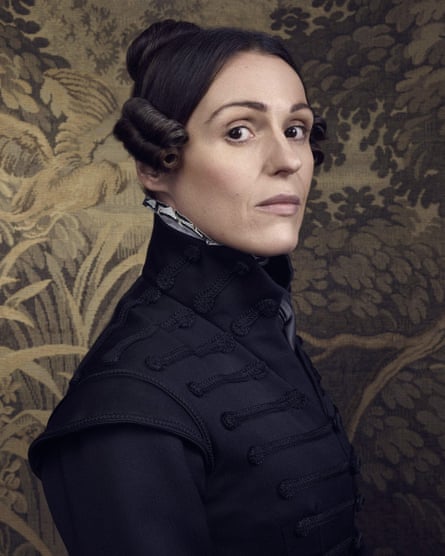
Jones has a notable LGBTQ+ fanbase, gaining a following from her role in Gentleman Jack. She has played queer characters several times and in 2020 won the Ally of the Year award at the British LGBT awards. But when one day she posted on social media about “working with someone who was advising on a trans character”, she could not believe the abusive comments. “I was like, oh my God, this is what this person gets every day? And then aimed at me as an ally. It’s frightening, isn’t it?”
“I’m always learning what feminism is, and it comes down to equality in the end,” she says. “My need and my want is to include other communities. I don’t want [feminism] to be just a moment in time. I want it to be something that is continually changing.”
Despite the myriad ways in which people find themselves drawn to witches, Jones believes their emergence is cyclical.
“Witches of today are also reclaiming nature and understanding that we’re in a tempestuous time with technology, with climate, with government shifts,” she says. Our age of uncertainty, she says, marries with the uncertain times of the witch trials – be it the puritans in Salem trying to establish a new society in an unfamiliar land or Bamberg in the midst of a war.
“The really shocking part for me was learning how deeply ingrained misogynistic ideas from those times of the witch trials are; how they are still in the law books,” she says. “No matter how far we think we’ve come, when you look into it, you’re like, fuck, no wonder we keep getting stuck, because it has to change at such a deeper level, and only the government can do that.”
Witches, then, are not born but made. Does that mean Jones’s witch era has finally arrived? And could this be the season of the witch for many of us?
“Society literally brings witches up from where they’ve been, within their communities or covens, when there are these huge seismic shifts,” says Jones, adding that the internet has allowed us to connect with mysticism and bring it to the fore.
“This is a cyclical thing. And what happens time and time again is those underdogs lose,” she says. “So right now is time to stand up and say, actually no, I’m not going to sit this one out.” Listening to her speak, it’s hard not to feel that she may well be at her most bewitching yet.
Suranne Jones: Investigating Witch Trials starts Sunday, 9pm, Channel 4.
Source: theguardian.com
